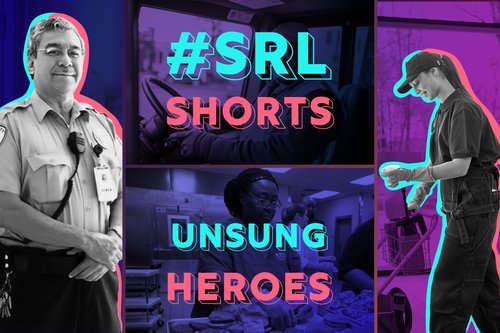
Who are the everyday heroes of your school community (Think: bus driver, janitor, cafeteria staff, security personnel, etc.) These unsung heroes often play a crucial role in making school a better place. Let's shine a spotlight on these remarkable individuals who help students learn, grow, and feel safe and supported.
This #SRLShorts is inspired by Hidden Brain’s special series “My Unsung Hero,” which includes stories of people whose kindness left a lasting impression.
YOUR ASSIGNMENT: In under two minutes, students share the story of an unsung hero at your school. (Students can film either themselves or interview fellow peers.) They should describe who they are, what they do, and why they believe they deserve recognition for their contributions. Don’t be vague, be specific. The video should include fun details and highlight your hero's impact on the student, their peers, or the school as a whole.
DEADLINE: FRIDAY, OCTOBER 6TH AT MIDNIGHT.
Students can film horizontal video but please remember to film with enough space around your subject to allow for vertical cropping.
We are encouraging students to publish videos on their own school social media accounts and tag us @studentreportinglabs on Instagram and @reportinglabs on TikTok.
You can also submit your best 3-5 responses here. Please do not include any text or music in your submissions.
The last day to submit video submissions will be Friday, October 6, 2023 at midnight.
Journalism is the activity of gathering, assessing, creating, and presenting news and information.
Media refers to all electronic or digital means and print or artistic visuals used to transmit messages.
A group of people who live in the same area (such as a city, town, or neighborhood). It can also be a group of people who have the same interests, religion, race, etc.
The condition of having or being composed of differing elements. Especially in the context of the inclusion of people of different races, cultures, etc. in a group or organization
The act or practice of including and accommodating people who have historically been excluded (as because of their race, gender, sexuality, or ability)
People are interested in other people. Everyone has something to celebrate and something to complain about. We like unusual stories of people who accomplish amazing feats or handle a life crisis because we can identify with them.
The people who read, watch and consume news. Often, journalists think about audience and newsworthiness in similar ways. How will the news story serve their local or national audience? Who am I writing the story for and why?
An account of past or current events. In journalism, stories are presented with a combination of people, facts, and typically includes a beginning, middle and end.
A person or other physical being in a narrative. Stories are made up of different characters who provide information and help shape the narrative with their knowledge, experience and perspective.
The term “empathy” is used to describe a wide range of experiences. A generally definition is the ability to sense other people’s emotions, coupled with the ability to imagine what someone else might be thinking or feeling. In media-making, creators can have empathy for their subjects and the audience can empathize with the characters.
The story of one person, has voiceover (VO), b-roll, pictures, nats (natural sound), interviews of family members or peers of that one person.
A view or judgment formed about something, not necessarily based on fact or knowledge.
A person who gives an account or tells the story of events, experiences, etc. In news, it is the person who adds spoken commentary to the video news story.
The main person or character in a story. There can be multiple subjects in a story. The subject can also be the main theme of your story.
Students leverage technology to take an active role in choosing, achieving and demonstrating competency in their learning goals, informed by the learning sciences. (ISTE)
Students communicate clearly and express themselves creatively for a variety of purposes using the platforms, tools, styles, formats and digital media appropriate to their goals. (ISTE)
Historical understanding requires recognizing this multiplicity of points of view in the past, which makes it important to seek out a range of sources on any historical question rather than simply use those that are easiest to find. It also requires recognizing that perspectives change over time, so that historical understanding requires developing a sense of empathy with people in the past whose perspectives might be very different from those of today. (NCSS D2.His.4.9-12 - D2.His.8.9-12)
Journalism
Representation
Education
Arts
School Safety
Social Media
Active Prompts
Beginner
Intermediate
Advanced
Mic
Post It Notes
Camera
Mobile Phone
Internet
Notebook
30-60 MINUTES